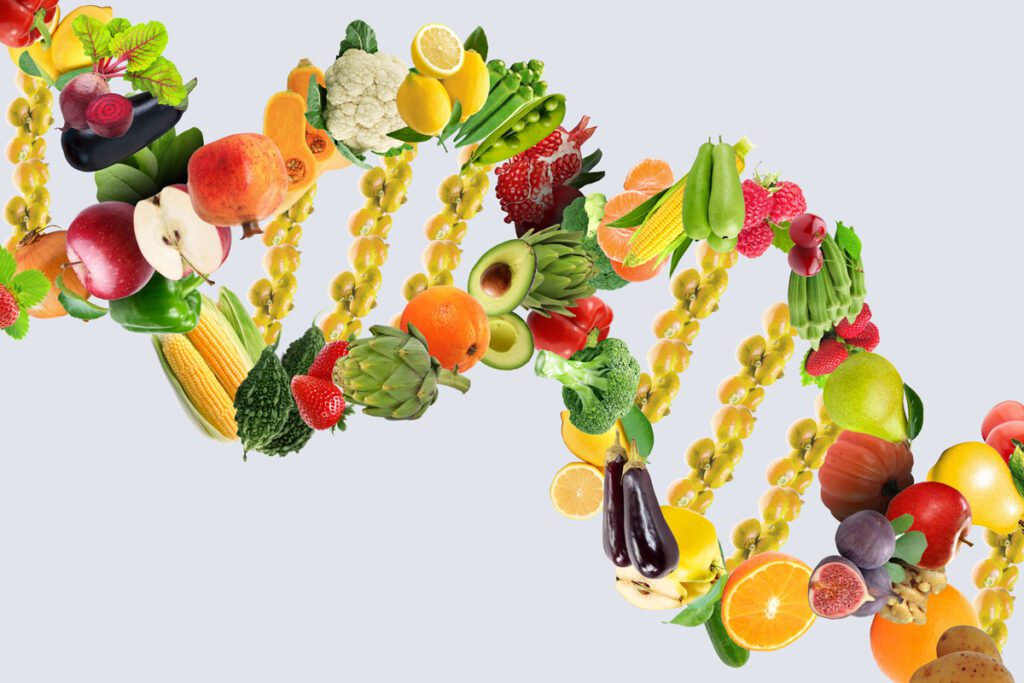Introduction: The Rise of Personalized Nutrition
Personalized nutrition, or nutrigenomics, uses an individual’s genetic makeup to tailor dietary recommendations for optimal health and well-being. By analyzing an individual’s genetic variations, specifically in genes related to nutrient metabolism, personalized nutrition plans can be developed to optimize nutrient absorption, utilization, and overall health outcomes.
The Science Behind Genomics in Diet Planning
To fully appreciate how personalized nutrition based on genomics works, let’s explore its core mechanisms and implications:
1. Understanding Genetic Variations
-
Nutrigenomics is the study of how genes and nutrients interact. It investigates how your unique genetic makeup influences your body’s response to specific dietary components.
-
Single Nucleotide Polymorphisms (SNPs) are small but common genetic variations that significantly impact how individuals absorb, metabolize, and utilize nutrients.
-
Genetic Testing can detect variations in genes responsible for metabolizing carbohydrates, fats, proteins, and vitamins. It also reveals predispositions to food sensitivities, intolerances, and chronic conditions.
2. Tailoring Dietary Recommendations
-
Personalized Nutrition Plans are crafted using an individual’s genetic profile. This helps address specific nutritional needs and prevent adverse responses to certain foods.
-
Targeted Dietary Interventions can support gut microbiome balance, manage gastrointestinal symptoms, and enhance nutrient absorption.
-
Example Use Cases include diet strategies for managing:
-
Type 2 diabetes (e.g., TCF7L2 gene variants)
-
Cardiovascular health (e.g., APOE gene and saturated fat response)
-
Cancer prevention (via antioxidant-rich diets for GSTT1 null variants)
-
3. Benefits of Personalized Nutrition
-
Improved Health Outcomes: Genetic alignment increases the effectiveness of diet plans, reducing chronic disease risk.
-
Enhanced Well-being: From weight management to better digestion and energy levels, genomics-guided diets support holistic health.
-
Optimized Performance: Athletes benefit from DNA-based plans that fine-tune recovery, endurance, and energy metabolism.
4. Considerations and Future Directions
-
Cost and Complexity: While full-genome sequencing is still costly, innovation is driving affordability.
-
Data Interpretation: Expertise is critical to translate raw genetic data into actionable nutrition advice.
-
Multifactorial Personalization: Diet planning should also consider non-genetic factors like age, activity level, stress, and pre-existing conditions.
-
Future of Nutrigenomics: Emerging research is exploring gene-diet-microbiome interactions and using AI to refine predictive dietary algorithms.
What is Personalized Nutrition Based on Genomics?
Personalized nutrition is a customized approach to diet planning, driven by your unique genetic blueprint. Instead of cookie-cutter diets, it tailors food choices based on how your body is wired to metabolize, absorb, and respond to nutrients.
Genomics comes into play by decoding your DNA, identifying SNPs (single-nucleotide polymorphisms), or tiny changes in genes that influence:
- Nutrient metabolism (e.g., MTHFR gene affecting folate metabolism)
- Lactose tolerance (like LCT gene variants)
- Caffeine sensitivity (CYP1A2 gene)
- Risk for obesity, type 2 diabetes, and heart disease
- Response to fats, carbs, exercise, and even stress
Key Genes That Influence Dietary Needs
| Gene | Function | Nutrition Insight |
|---|---|---|
| MTHFR | Folate, B12 metabolism | Need for methylated B vitamins |
| FTO | Fat storage & obesity | Sensitive to saturated fats, carbs |
| APOE | Cholesterol metabolism | Avoid saturated fats (especially APOE ε4) |
| CYP1A2 | Caffeine processing | Slow metabolizers should limit caffeine |
| LCT | Lactose digestion | Indicates lactose intolerance |
| GSTT1 | Detox pathway | Needs antioxidant-rich diet |
| SLC23A1 | Vitamin C absorption | May need dietary or supplemental boost |
Functional Benefits of DNA-Based Diet Planning
- Precision: Moves away from one-size-fits-all plans to custom strategies.
- Prevention: Helps identify and mitigate chronic disease risks early.
- Motivation: People tend to comply better when they see their DNA “asking” them to.
- Functional Approach: Aligns beautifully with clinical and functional nutrition, especially in chronic, autoimmune, or metabolic conditions.
Personalized Nutrition in Action
Let’s say someone has:
- FTO variant: You’d recommend a diet lower in saturated fats and refined carbs, possibly Mediterranean-style.
- MTHFR mutation: Prioritize methylated folate, B12, and avoid folic acid-fortified foods.
- CYP1A2 slow metabolizer: Limit caffeine, especially in anxiety-prone or hypertensive clients.
- Lactase non-persistence (LCT): Recommend fermented dairy like curd or plant-based alternatives.
How It Looks on a Plate: From Genes to Meals
Your DNA doesn’t just speak in scientific terms—it speaks through your food choices. Below are examples of how specific genetic traits translate into personalized nutrition strategies:
| Trait | Personalized Recommendation |
|---|---|
| Low Vitamin D Gene Expression | Prioritize sunlight exposure and supplement with Vitamin D3 + K2 to maintain optimal levels. |
| High Sodium Sensitivity | Follow a DASH-style low-sodium eating plan with potassium-rich foods like bananas, spinach, and lentils. |
| Oxidative Stress Risk | Eat a diet rich in antioxidants: include polyphenol-packed berries, cruciferous vegetables, and omega-3s. |
| Sluggish Detox Genes (e.g., GSTT1) | Emphasize detox-supportive foods: broccoli, cauliflower, garlic, onions, and reduce alcohol intake. |
This DNA-to-diet mapping forms the backbone of genomics-based personalized nutrition—where every bite is aligned with your biology.
Integration with RECOUP Health’s 4R Root-Cause Framework
| RECOUP Stage | Genomics Application |
|---|---|
| Relief | Symptom-based diet changes (e.g., reduce dairy for LCT SNPs) |
| Root-Cause | SNP analysis to reveal metabolic inefficiencies |
| Rebalance | Adjust macro/micronutrients to genetic needs |
| Regeneration | Long-term dietary blueprint informed by genetics |
This synergy helps move care from generalized to genetic precision, aligning perfectly with RECOUP’s philosophy.
How It Looks on a Plate: From Genes to Meals
Your DNA doesn’t just speak in scientific terms—it speaks through your food choices. Below are examples of how specific genetic traits translate into personalized nutrition strategies:
| Trait | Personalized Recommendation |
|---|---|
| Low Vitamin D Gene Expression | Prioritize sunlight exposure and supplement with Vitamin D3 + K2 to maintain optimal levels. |
| High Sodium Sensitivity | Follow a DASH-style low-sodium eating plan with potassium-rich foods like bananas, spinach, and lentils. |
| Oxidative Stress Risk | Eat a diet rich in antioxidants: include polyphenol-packed berries, cruciferous vegetables, and omega-3s. |
| Sluggish Detox Genes (e.g., GSTT1) | Emphasize detox-supportive foods: broccoli, cauliflower, garlic, onions, and reduce alcohol intake. |
This DNA-to-diet mapping forms the backbone of genomics-based personalized nutrition—where every bite is aligned with your biology.
Mock Genetic Profile Summary: Meet Aryan
To bring genomics-based personalized nutrition to life, let’s walk through a fictional client example.
Client Snapshot:
-
Name: Aryan
-
Age: 38
-
Gender: Male
-
Lifestyle: Sedentary tech job, occasional walking
-
Health Goals: Weight loss, improved insulin sensitivity, enhanced mental focus
Genetic Traits & Implications:
| Gene | Variant | Implication |
|---|---|---|
| FTO | Risk allele | Increased fat storage, carb sensitivity |
| MTHFR C677T | Homozygous mutation | Poor folate and B12 methylation |
| CYP1A2 | Slow metabolizer | Higher sensitivity to caffeine |
| APOE ε4 | Present | Greater LDL increase with saturated fat |
| LCT | Non-persistent | Likely lactose intolerant |
| GSTT1 | Null variant | Reduced detoxification capacity |
Personalized Nutrition Plan for Aryan
Dietary Pattern:
-
Style: 16:8 Intermittent Fasting
-
Approach: Low Glycemic, Anti-inflammatory, Moderate-fat
11:00 AM – First Meal (Post Fast)
-
Main:
-
Methi Thepla (gluten-free: jowar + flaxseeds)
-
Avocado chutney (healthy fats, supports methylation)
-
-
Add-ons:
-
Ashwagandha tea (caffeine-free adaptogen)
-
Activated B-complex (methylated folate + B12)
Why? Supports MTHFR, anti-inflammatory, dairy-free, low glycemic.
-
2:00 PM – Main Meal
-
Option 1:
-
Quinoa + Moong Dal Khichdi
-
Stir-fried crucifers (broccoli, red cabbage) with turmeric, garlic
-
Amla pickle (Vitamin C boost)
-
-
Option 2:
-
Millets (Kodo or Foxtail) with sambar
-
Beetroot & sesame salad
Why? Supports GSTT1, APOE ε4, anti-inflammatory, low saturated fat.
-
6:30–7:00 PM – Light Dinner
-
Option 1:
-
Vegetable soup with tofu or walnuts
-
Moringa stir-fry
-
1 soft-boiled egg (if APOE ε4-tolerable)
-
-
Option 2:
-
Methi & sprouts stir fry
-
Moong dosa or besan chilla
Why? High in protein, detox support, no lactose, light on digestion.
-
Snacks & Supplements
Optional Snacks (within eating window):
-
Pumpkin + sunflower seed trail mix
-
Coconut water with chia
-
Apple slices with almond butter
Gene-Based Supplements:
| Need | Supplement |
|---|---|
| MTHFR | Methylated folate + B12 |
| APOE ε4 | Omega-3 (EPA+DHA), avoid sat. fats |
| GSTT1 Detox | NAC or milk thistle extract |
| Vitamin D Deficit | D3 with K2 (2000 IU) |
| Gut Health | Probiotic (Lactobacillus + Bifido) |
Lifestyle Add-ons for Aryan
-
Exercise: Fasted walking + resistance training 3×/week
-
Sleep: Blue-light blockers after 8 PM, magnesium-rich foods
-
Stress: Journaling, box breathing, Tulsi or ashwagandha
Final Word: This isn’t biohacking fluff—it’s clinical nutrition 2.0. Ancient wisdom meets modern DNA science.
RECOUP Health × Personalized Genomics: A Harmonious Integration
Personalized nutrition beautifully complements RECOUP Health’s 4R Root-Cause Rehabilitation Framework. Here’s how:
1. Relief → Genomic Insights for Symptom Management
-
SNPs like LCT (lactose intolerance) or FTO (weight gain risk) help explain symptom triggers.
-
Dietary modifications based on gene profiles bring rapid symptom relief (e.g., removing dairy or caffeine).
2. Root-Cause Reversal → Functional Genomics in Action
-
Nutrigenomics reveals why symptoms persist:
-
Poor methylation (MTHFR)
-
Inefficient detox (GSTT1, GSTM1 deletions)
-
Inflammation-prone genes (TNF-α, IL-6)
-
-
These markers uncover the “why” behind the “what.”
3. Rebalance → Nutritional Biochemistry in Tune with Genes
-
Optimize macros (carb/fat ratios) based on metabolism genes
-
Adjust micronutrients like B12 and folate for absorption issues
-
Use CLOCK gene data to support circadian rhythm and sleep-nutrition links
4. Regeneration → Long-Term Vitality via DNA-Informed Living
-
Gene-informed choices turn into lifelong wellness routines
-
Personalized food + movement + sleep + stress = lasting transformation
Alignment Table: RECOUP & Genomics-Based Nutrition
| RECOUP Principle | Genomics Nutrition Application |
|---|---|
| Root-cause diagnosis | SNP testing for nutrient metabolism & chronic disease risks |
| Personalized treatment | DNA-based meal plans, supplementation protocols |
| Sustainable wellness | Epigenetic food and lifestyle interventions |
| Holistic care | Integration of gut health, detox, inflammation, and methylation pathways |
| Long-term behavior change | Education rooted in the client’s own genetic narrative |
Summary in a Nutshell
RECOUP Health’s 4R approach provides the fertile ground for genomics-based nutrition to thrive. It’s where functional meets foundational, and generic care evolves into genetic transformation.
From treating to transforming. From guesswork to gene work.
Ethical and Practical Considerations
-
Costs: Genetic testing is becoming more accessible, but not universal yet.
-
Privacy: Data protection is essential—choose certified labs.
-
Limitations: Genes offer risk, not certainty; lifestyle and environment matter too.
Conclusion: A New Era in Nutritional Medicine
Personalized nutrition based on genomics isn’t a trend—it’s the future of medicine and wellness. It’s not just about what you eat, but why your body needs it. Your DNA holds the keys. All we have to do is listen.
“Let thy DNA guide the food, and the food guide thy destiny.” — Modern-day Hippocrates
Ready to Let Your Genes Guide Your Health?
At Recoup Health, we don’t believe in guesswork—we believe in gene-guided care that transforms lives.
If you’re ready to:
-
Move beyond one-size-fits-all diets
-
Address chronic health issues at the root,
-
Optimize your nutrition, performance, and longevity…
Then it’s time to take the next step.
📞 Call us at: +91-080-69274900
🌐 Visit: www.recoup.health
Book a Personalized Genomic Nutrition Consultation Today




